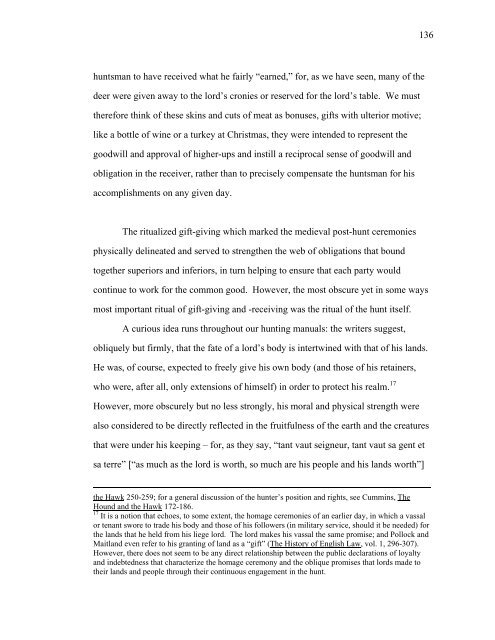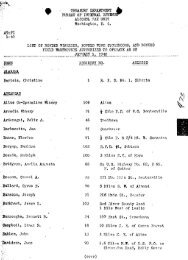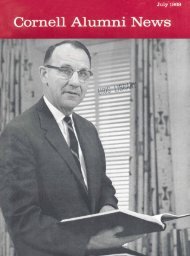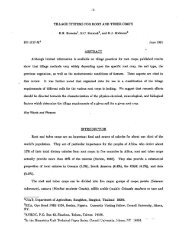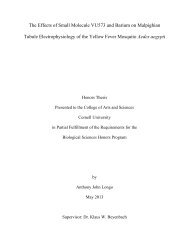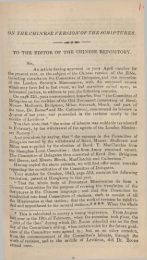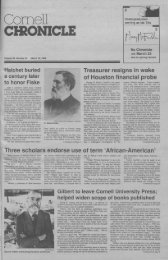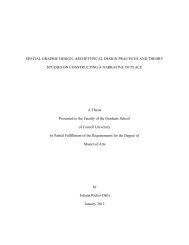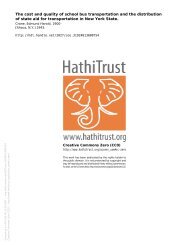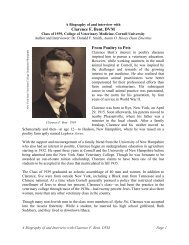Chapter 4 The Gift.pdf - eCommons@Cornell
Chapter 4 The Gift.pdf - eCommons@Cornell
Chapter 4 The Gift.pdf - eCommons@Cornell
Create successful ePaper yourself
Turn your PDF publications into a flip-book with our unique Google optimized e-Paper software.
huntsman to have received what he fairly “earned,” for, as we have seen, many of the<br />
deer were given away to the lord’s cronies or reserved for the lord’s table. We must<br />
therefore think of these skins and cuts of meat as bonuses, gifts with ulterior motive;<br />
like a bottle of wine or a turkey at Christmas, they were intended to represent the<br />
goodwill and approval of higher-ups and instill a reciprocal sense of goodwill and<br />
obligation in the receiver, rather than to precisely compensate the huntsman for his<br />
accomplishments on any given day.<br />
<strong>The</strong> ritualized gift-giving which marked the medieval post-hunt ceremonies<br />
physically delineated and served to strengthen the web of obligations that bound<br />
together superiors and inferiors, in turn helping to ensure that each party would<br />
continue to work for the common good. However, the most obscure yet in some ways<br />
most important ritual of gift-giving and -receiving was the ritual of the hunt itself.<br />
A curious idea runs throughout our hunting manuals: the writers suggest,<br />
obliquely but firmly, that the fate of a lord’s body is intertwined with that of his lands.<br />
He was, of course, expected to freely give his own body (and those of his retainers,<br />
who were, after all, only extensions of himself) in order to protect his realm. 17<br />
However, more obscurely but no less strongly, his moral and physical strength were<br />
also considered to be directly reflected in the fruitfulness of the earth and the creatures<br />
that were under his keeping – for, as they say, “tant vaut seigneur, tant vaut sa gent et<br />
sa terre” [“as much as the lord is worth, so much are his people and his lands worth”]<br />
the Hawk 250-259; for a general discussion of the hunter’s position and rights, see Cummins, <strong>The</strong><br />
Hound and the Hawk 172-186.<br />
17 It is a notion that echoes, to some extent, the homage ceremonies of an earlier day, in which a vassal<br />
or tenant swore to trade his body and those of his followers (in military service, should it be needed) for<br />
the lands that he held from his liege lord. <strong>The</strong> lord makes his vassal the same promise; and Pollock and<br />
Maitland even refer to his granting of land as a “gift” (<strong>The</strong> History of English Law, vol. 1, 296-307).<br />
However, there does not seem to be any direct relationship between the public declarations of loyalty<br />
and indebtedness that characterize the homage ceremony and the oblique promises that lords made to<br />
their lands and people through their continuous engagement in the hunt.<br />
136


